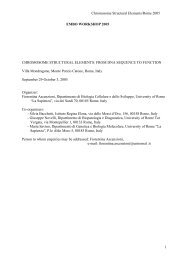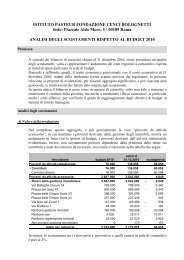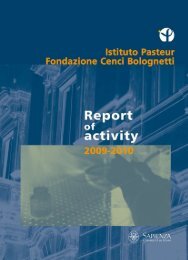download report - Istituto Pasteur
download report - Istituto Pasteur
download report - Istituto Pasteur
You also want an ePaper? Increase the reach of your titles
YUMPU automatically turns print PDFs into web optimized ePapers that Google loves.
E. Ziparo - The role of Toll Like Receptors in immune responses to infections and in inflammation associated pathologies<br />
cer risk provides evidence for a role of TLRs in<br />
prostate cancer. Moreover, conflicting <strong>report</strong>s have<br />
been published claiming pro- or anti-tumoral effects<br />
of TLR9 agonist on human prostate cancer cell lines.<br />
Mounting evidence shows that the enhancement of<br />
innate and adaptive immunity represents the principal<br />
mechanism by which TLR stimulation produces<br />
antitumour activity. However, a direct pro-apoptotic<br />
effect of TLR agonists on TLR3 + and TLR9 +<br />
tumour cells has been recently <strong>report</strong>ed (Salaun, J<br />
Immunol. 2006; Salaun, Clin. Cancer Res. 2007). Based<br />
on this evidence, in order to elucidate the role of<br />
TLRs in the etiology and pathogenesis of prostate<br />
cancer, we used as experimental model three different<br />
cell lines: the prostatic benign human hyperplasia<br />
cell line BPH-1, the androgen responsive cell line<br />
LNCaP and the androgen unresponsive PC3 cell line.<br />
Firstly, we investigated the effect of the TLR3 agonist<br />
poly (I:C) on the proliferative and apoptotic rates<br />
of LNCaP and PC3. We demonstrated that poly (I:C)<br />
elicits inhibition of proliferation associated with a<br />
significant induction of TLR3-mediated apoptosis in<br />
both prostate cancer cell lines. However, we found<br />
that LNCaP cells are very sensitive to poly (I:C)induced<br />
apoptosis, whereas PC3 cells, a more aggressive<br />
prostate cancer cell line, shows a significant<br />
resistance to this apoptotic stimulus. Among differently<br />
expressed genes in two cell lines, WT p53 and<br />
androgen receptor (AR) are expressed in LNCaP<br />
cells, whereas PC3 cells, , are null for both p53 and<br />
AR. The dependence of prostate tumour on AR<br />
activity is exploited in treatment of disseminated<br />
prostate cancers, wherein ablation of AR function<br />
induces the regression of prostate tumours mainly<br />
through increased apoptosis. Tumour progression is<br />
associated with inappropriately restored AR function,<br />
despite sustained androgen ablation and/or the<br />
110<br />
use of AR antagonists (Hsieh, Lancet Oncol. 2007)<br />
Since PC3 cells lack AR and p53 expression, the differences<br />
in response to poly (I:C) between LNCaP<br />
and PC3 cells might result from variations in the AR<br />
and p53 status of these cells. To determine whether<br />
these differences may account for the minor susceptibility<br />
of PC3 cells to poly (I:C)-induced effects, we<br />
performed apoptosis assay on PC3 cells stably transfected<br />
with AR plasmid or transiently transfected<br />
with p53 plasmid (PC3–p53) and treated with poly<br />
(I:C). Our results indicate that forced expression of<br />
AR in androgen-independent prostate cancer cell<br />
lines confers a higher sensitivity to poly (I:C)induced<br />
apoptosis, whereas no increment of apoptosis<br />
was observed in PC3–p53 cells.<br />
Finally, we identified a new IFN-B-independent<br />
pathway that involves protein kinase C (PKC)-alpha<br />
activation as responsible for the poly (I:C)-mediated<br />
apoptosis in LNCaP cell line.<br />
Selected publications<br />
Dal Secco V, Riccioli A, Padula F, Ziparo E, Filippini<br />
A. Mouse Sertoli cells display phenotypical and functional<br />
traits of antigen-presenting cells in response<br />
to interferon gamma. Biol Reprod. 2008, 78: 234-42.<br />
Paone A, Starace D, Galli R, Padula F, De Cesaris P,<br />
Filippini A, Ziparo E, Riccioli A. Toll like receptor 3<br />
triggers apoptosis of human prostate cancer cells<br />
through a PKC-alpha-dependent mechanisms.<br />
Carcinogenesis 2008, 29:1334-42.<br />
Starace D, Galli R, Paone A, De Cesaris P, Filippini<br />
A, Ziparo E, Riccioli A. Toll-like receptor 3 activation<br />
induces antiviral immune responses in mouse<br />
Sertoli cells. Biol Reprod. 2008, 79: 766-75.








